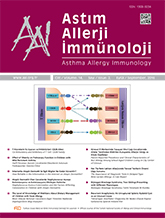


Objective: The prevalence of asthma is increased in obese individuals. There is no concrete evidence that an increase in body mass index is associated with a loss of pulmonary function in childhood asthma. Our aim was to investigate the effect of obesity, atopy, and sex on pulmonary function in asthmatic children.
Materials and Methods: This study is a cross-sectional analysis in children with mild persistent asthma. A total of 76 obese and 55 lean children with asthma were recruited. All of the participants were assessed by pulmonary function tests. Skin prick tests including common aeroallergens were performed to all patients.
Results: No differences were found in pulmonary function test parameters between obese and lean patients with asthma. In obese patients with asthma, the ratio of forced expiratory volume in 1 s to forced vital capacity (FEV1/FVC) was significantly lower in nonatopic (92.1±6.4) than in atopic patients (95.5±5.3, p=0.02). We also demonstrated that FEV1/FVC was significantly lower in nonatopic obese patients (92.1±6.4) than in nonatopic lean patients with asthma (95.6±4.7, p=0.05).
Conclusion: Obesity does not seem to be affecting pulmonary function in children with well-controlled mild persistent asthma. However, airways of nonatopic obese asthmatics are negatively affected.